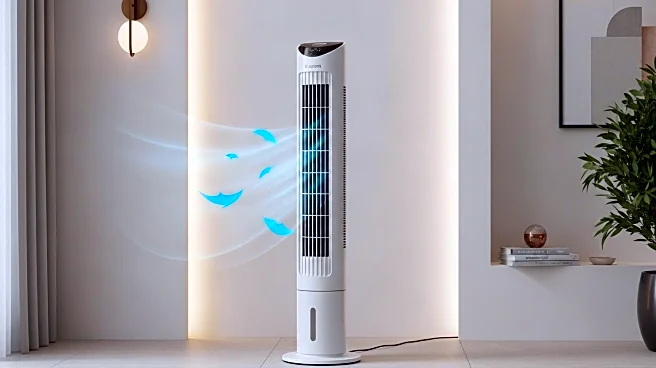What's Happening?
Dyson has announced a significant price reduction on its AM07 Tower Fan, now available for $249, down from the original price of $369. This represents a 32% savings on one of Dyson's best-selling cooling fans. The AM07 utilizes Dyson's Air Multiplier technology, providing a smooth and consistent airflow without the buffeting typical of traditional bladed fans. The fan features ten precise airflow settings and a 70-degree oscillation, ensuring even air distribution across a room. Additionally, it includes a sleep timer function, allowing users to program the fan to shut off after a set period, ranging from 15 minutes to 9 hours. The fan is designed to be quieter than traditional fans, making it suitable for bedtime use. A magnetized remote control allows for easy adjustment of settings without needing to get up.
Why It's Important?
The price drop on the Dyson AM07 Tower Fan makes it more accessible to consumers looking for high-quality cooling solutions. Dyson's technology offers a more efficient and quieter alternative to traditional fans, which can be particularly beneficial in residential settings where noise and energy efficiency are concerns. The fan's design also enhances safety, especially in homes with children or pets, due to its bladeless construction. This move by Dyson could influence consumer expectations for premium home appliances, potentially driving competitors to offer similar discounts or innovations in fan technology.
What's Next?
As Dyson clears out stock of the AM07 Tower Fan, consumers may see similar discounts on other Dyson products, particularly as the company aims to maintain its market position in the home appliance sector. The success of this sale could lead to increased consumer interest in Dyson's other airflow products, such as air purifiers and humidifiers. Additionally, competitors may respond with their own promotions or technological advancements to capture market share.
Beyond the Headlines
The clearance sale reflects broader trends in consumer electronics, where companies often reduce prices to manage inventory and stimulate demand. This strategy can also serve as a test for new pricing models or product features that may be introduced in future iterations. The focus on quiet, efficient airflow solutions aligns with growing consumer interest in sustainable and energy-efficient home technologies.









